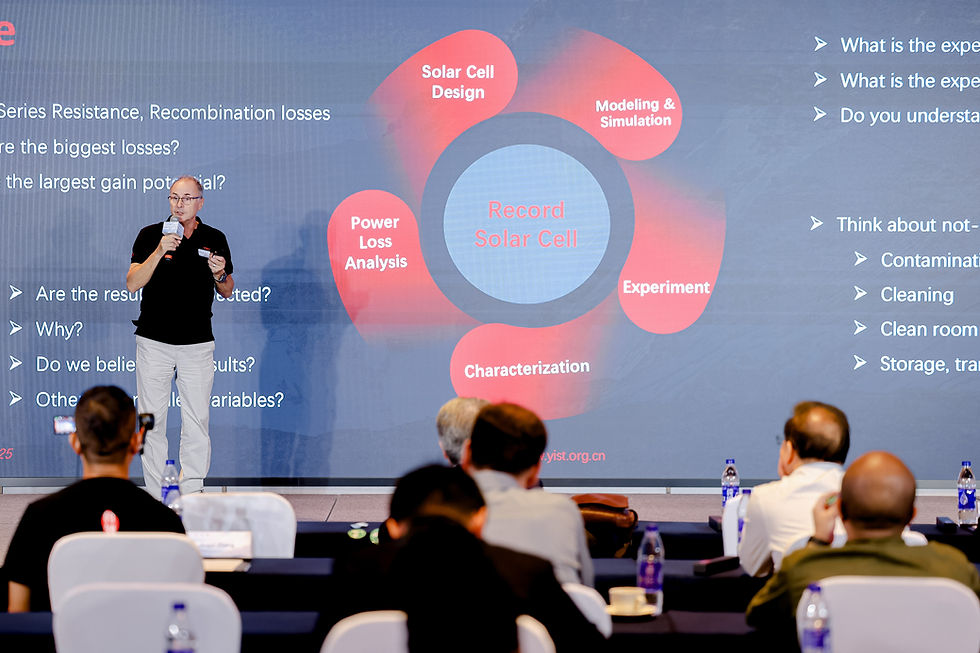“Critical gap in clean energy leadership development” addressed through partnership between YIST, ACAP and UNSW
- alisonpotter2
- Jul 28, 2025
- 3 min read
ACAP and UNSW’s Empowering Emerging Leaders in Clean Energy (ELICE) program has highlighted the extraordinary potential of strategic international collaboration, with its first workshop in June 2025 achieving outstanding results. A standout success has been the partnership between the Yangtze Institute for Solar Technology (YIST), UNSW, and the Australian Centre for Advanced Photovoltaics (ACAP) – a collaboration that is already accelerating innovation, building global capability, and forging deep, bilateral relationships in solar energy.

“The workshop's success exceeded our expectations, demonstrating the tremendous value of bringing together Australia's research excellence with China's industrial capabilities.” – Dr Pierre Verlinden, Chief Scientist, YIST
YIST, established in 2021 with the support of the Jiangsu Industrial Technology Research Institute and the Jiangyin Municipal Government, is fast becoming a key player in solar innovation in China. It collaborates closely with several leading Chinese PV companies and academic institutions globally. With a vision for leadership in solar cell R&D, testing, and talent cultivation, YIST is a natural partner for UNSW and ACAP in the ELICE initiative.
A deepening strategic alliance
The roots of the UNSW–YIST connection trace back more than a decade, when Prof. Bram Hoex (now with UNSW and ACAP) and Dr Pierre Verlinden (now Chief Scientist at YIST) began collaborating in 2010. At the time, Prof. Hoex was based at the Solar Energy Research Institute of Singapore (SERIS) and Dr Verlinden at Trina Solar. Their professional relationship and shared vision for solar innovation have since helped catalyse deep institutional ties between UNSW and YIST.
“We have a formal agreement with YIST to collaborate on the development of a solar cell calibration lab to support both the academic and industry sectors. This builds on work I began at SERIS and represents a major strategic benefit for ACAP.” – Prof. Bram Hoex, ACAP Node Leader
The lab at YIST will offer state-of-the-art calibration capabilities, including quantum efficiency (QE) measurements and precision photoluminescence diagnostics for next-generation tandem solar cells. This facility, which is expected to be operational by late 2025, will provide vital services for both Chinese and Australian researchers and manufacturers, strengthening ACAP’s international reach.
ELICE Workshop 1: Building capability and connection
The first ELICE workshop brought together 39 emerging clean energy leaders from Australia and China in Shanghai and Jiaxing, co-hosted by ACAP, UNSW and YIST. The program included expert presentations, site visits, and rich cross-cultural exchange. YIST contributed over AUD $30,000 in cash and in-kind support – covering logistics, venues, speakers, and more.
“The quality of participants, the depth of technical discussions, and the genuine partnerships that emerged from this exchange have reinforced our conviction that this program addresses a critical gap in clean energy leadership development.” – Dr Pierre Verlinden
The participants represented a broad mix of academic, industry, and early-stage leadership backgrounds. Early indicators suggest the program had a transformational impact on participants' perspectives and networks, particularly in preparing them to lead in a global, collaborative energy sector.

Scaling up for future rounds
YIST has committed to further investment in future ELICE workshops, offering up to AUD $100,000 in cash and in-kind support to expand the program’s scope. This includes enhanced industry partnerships, deeper engagement with PV sector leaders, and integration with YIST’s educational and incubation services.
Dr Jessica Yajie Jiang, who leads the ELICE program from UNSW, notes that this partnership is built not only on shared technical goals but also on trust and long-term collaboration.

“We’re building something unique – an international leadership program with deep technical roots and real industrial impact. The momentum from our first workshop is just the beginning.” – Dr Jessica Yajie Jiang, Program Lead, ELICE (UNSW)
A model for bilateral clean energy collaboration
With shared challenges in climate, energy security, and industrial transformation, the ACAP–UNSW–YIST alliance through ELICE is setting a new benchmark for effective international collaboration in solar energy.
As Dr Verlinden writes in his letter of support:
“UNSW’s global leadership in solar research and its remarkable success in training many of the world's leaders in the solar sector make it an ideal partner. We believe this program will forge enduring partnerships, foster the next generation of clean energy leaders, and create lasting impacts in renewable energy deployment.”




Comments